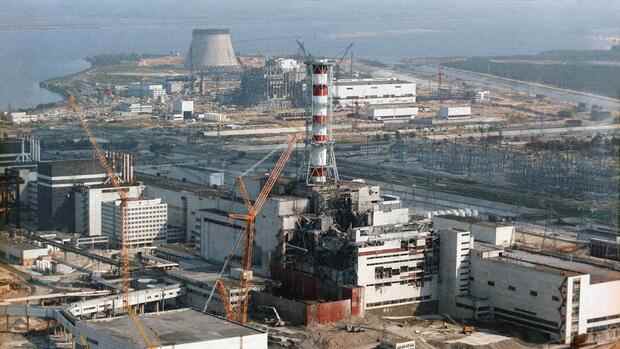That was no coincidence, but the result of decades of preparatory work by Russian secret services in Ukraine. Research by the Reuters news agency in both countries revealed that Russia had systematically infiltrated the neighboring country’s institutions.
Chernobyl, which was the shortest route to Kyiv for the invaders advancing from the north, was to be the prelude to a takeover of power over all of Ukraine. According to five people familiar with the war preparations, Moscow was counting on using only small military forces to force President Volodymyr Zelensky to surrender, resign or flee within days, thanks to Ukrainian henchmen.
Ever since the nuclear disaster of 1986, Chernobyl has been a bastion of secret services controlled from Moscow. After the worst reactor accident in history, the background to which was traded as a state secret, the KGB sent more than 1,000 employees to clean up, according to Ukrainian documents. KGB officers were installed in influential positions and, according to an insider, continued to receive orders from Russia even after the end of the Soviet Union in 1991.
Top jobs of the day
Find the best jobs now and
be notified by email.
Although the power plant has been out of service for more than 20 years, scores of employees are still busy with the decommissioning and monitoring work. In November 2021, Russia reactivated its old connections to Chernobyl.
Undercover agents bribed those responsible to prepare the ground for a bloodless occupation, an insider said. In Chernobyl, defectors from the Ukrainian secret service SBU were also supposed to hand over Ukrainian military plans to employees of the Russian secret service FSB. Both services emerged from the Soviet KGB, where Putin also began his career.
Valentin Viter, deputy general director of the plant and colonel of the SBU, was responsible for the safety of Chernobyl on February 24. The 47-year-old is now in custody. He is said to have fled his post without permission and is accused of treason, court documents have revealed to Reuters.
Witer had called in sick on February 18 and called the head of the Chernobyl-based unit of the National Guard, Yuri Pindak, from his apartment in Kyiv on the day of the invasion. “Take care of your people,” Witer told him, as Witer himself stated in his interrogation.
In fact, the 169 National Guardsmen tasked with protecting the nuclear complex laid down their arms shortly thereafter. Viter’s lawyer Olexander Kovalenko explained that Viter did not ask his interlocutor to surrender, but reminded him of his responsibility for numerous people.
>> Read here: Nuclear Power Plants in Ukraine – What are the Dangers of War?
Pindak and other National Guardsmen were taken as prisoners by the Russian occupiers when they pulled out of Chernobyl. Nothing is known about their whereabouts.
Goal: overthrow in Ukraine
The Kremlin had chosen former Ukrainian MP Oleg Tsarev to head a puppet government in Kyiv, several Russian insiders said, confirming US intelligence information.
Tsarev, who once campaigned for a democratic presidential election and later supported pro-Russian separatists, runs two hotels in Crimea, which Russia annexed in 2014.
The Ukrainian President dismissed employees from his own ranks.
(Photo: dpa)
On the morning of February 24, the 52-year-old told his 200,000 followers on Telegram: “I’m in Ukraine. Kyiv will be liberated from fascists.” Russia calls the Ukrainian government “fascists”.
But Zelensky did not capitulate, the Russian army was repelled by Ukrainian troops in front of Kyiv, and Tsarev stuck to his job: On June 10, he again advertised one of his hotels in Crimea with holiday rooms for 1,500 rubles a night on Telegram. That’s the equivalent of 24 euros. Tsarev said Reuters information about Russia’s actions in Ukraine had “very little to do with reality”.
This is how the Handelsblatt reports on the Ukraine war and the consequences:
Like Tsarev, many of the so-called sleepers who were supposed to bring about the coup in Ukraine after the Russian invasion failed, several insiders from Russia and Ukraine have said.
infiltration of the Ukrainian state
According to four informants, the fact that the attack, which the Kremlin still describes as a “special military operation”, ended in a comprehensive war with bitter resistance from Ukraine was due to structural problems in the Russian agent network.
the former Prosecutor General of Ukraine was dismissed.
(Photo: dpa)
The Kremlin’s sources in Ukraine have exaggerated their own influence, said an insider close to the Moscow-backed separatist leadership in eastern Ukraine. “They know a little bit, but they always say what the leadership wants to hear, because otherwise they won’t get paid.” Putin’s power apparatus relied on “clowns”.
However, one thing Russia did by infiltrating the Ukrainian state: it sowed mistrust and revealed weaknesses in the SBU, which employs almost 30,000 people. On July 17, Zelensky fired SBU chief Ivan Bakanov, a longtime confidante, and prosecutor general Iryna Venediktova.
>>Read here: Game for power in political Kyiv – The dismissals benefit above all a Selensky adviser
As justification, the President referred to a large number of employees of both agencies who are suspected of treason. 651 cases of high treason and collaboration have now been opened. In addition, more than 60 members of the SBU and the Attorney General’s Office in Russian-occupied areas defected to the attackers.
The invisible threat is serious, Secretary of the National Security and Defense Council Oleksiy Danilov told Reuters: “Unfortunately, in addition to the external enemy, we also have an internal enemy, and this enemy is no less dangerous.”
More: “Treason” to subordinates – That’s why Selenski fired the head of the secret service and the attorney general
